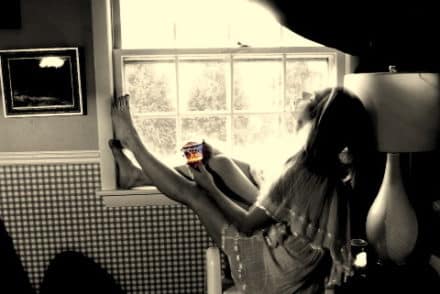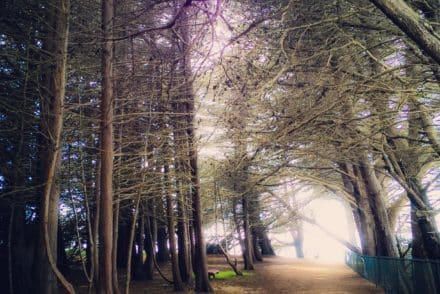By Donna Steiner
I had a lover who whispered to me. Not just in public, to say something private, and not just in bed, but often, as though we had two distinct languages, one audible and one intimate. “I made you pizza,” she’d whisper, and it was thrilling, although I don’t think she was trying to thrill me. We were surprised by one another, gliding into relationship, building a new thing of hushed tones, notes and silences, pauses.
Throughout my 20s I lived in big, cheap apartments in central New York. The locals called them flats, and they were laid out like ladders, one room after another, stretching the length of three or four story houses. Typically the living room would be at one end and the kitchen or a bedroom at the other. Living on the top floor was the best in that it was the quietest. The other floors usually meant you could hear upstairs tenants walking, which always sounded like large men wearing heavy boots or women in heels. I thought of myself, then (and now), as exceedingly quiet, but I practiced on occasion one noisy habit. I liked to lie on the floor in the living room and listen to music turned up loud. Those were the days of large stereo speakers. We had two and they were crate sized. I’d lie right between them and put on “Jungleland” by Bruce Springsteen, feeling the base pulse up through my hips and shoulders and thump against my ribs. I’d wait for the 4-minute mark where Clarence Clemons’ saxophone came in with a long, slow, lamenting riff and I’d feel transported, in love with everything. And then I’d play the song again. And again.
Once, perhaps in retaliation, the downstairs neighbors embarked on a course of John Cougar Mellencamp songs, a full album, played on repeat. For weeks. To this day, I have a bit of difficulty listening to Mellencamp, and the names “Jack and Diane” send a little shudder through me.
When I was a kid, my mother and father would argue. Parents fought openly back then; there was no major attempt to “keep it from the kids.” But every once in a while, they’d get into something serious, and they’d go downstairs. I couldn’t hear what they were saying then, so I’d sneak out of my bedroom and sit at the top of the steps, eavesdropping as though my life depended on it. Then I’d crawl into bed next to one of my brothers or sisters whom I felt obligated to comfort, whether they were awake or not. I was, of course, trying to comfort myself.
It is autumn, and our house in the woods is collecting bushels of falling leaves. The trees never stop rustling at this time of year, and when we visit the nearby lake it sounds like rustling leaves, and when we’re at home the trees sound like the lake’s waves. Sometimes fall on our road is blazing orange and red, but this year it is shades of yellow and gold. The sound, however, is the same: an ongoing series of rush and ebb, whoosh and whisper. It is the greatest condolence.
Every family on our block in New Jersey, when we were in elementary school, had a swimming pool – except for us. This was both good and bad news. Bad because I couldn’t swim whenever I wanted to, but good because on a regular basis I’d be invited to a friend’s pool. It was never quite enough, but it was better than nothing. (It didn’t help that, from my perspective, most of the pools were rarely, if ever, used. I didn’t see why families didn’t offer a kind of open invitation to me to swim at their homes…)
One year I discovered the joy in talking underwater. I had always loved being below the surface, and practiced holding my breath while swimming laps in circular above-ground pools. But one day a friend casually informed me that we could speak underwater, and we immediately descended and practiced simple sentences, enunciating as clearly as possible while trying not to swallow water. Every utterance was accompanied by big bubbles and amplified by our arms paddling the water so we could stay submerged. This activity still intrigues me; I love being underwater and listening for what is happening above and below the water’s lip.
Last week I was eating breakfast at my desk. The computer was on and I was checking email. I heard a soft, hard-to-define sound, so distinct I knew I hadn’t heard it ever before. I looked down and saw that a very large spider had fallen from the ceiling and landed directly next to my cereal bowl. It appeared stunned, as I was. I looked around for something I could use to rescue the spider – I thought I’d transfer it outdoors – and when I looked back, two seconds later, it was gone. This caused considerable consternation, because although I am not afraid of spiders, in general, this was a BIG spider and I worried that it was silently crawling up my leg or kneading my hair or getting ready to bite my back. I never located it and now wonder if I hallucinated it. But that sound convinces me it was real – exactly the sound you’d expect an uncomfortably large spider to make if it fell from the ceiling onto your desk.
If you Google “most beautiful sounds in the world,” you may stumble upon the results of a 2014 contest that polled exactly that. Finalists included, as might be anticipated, a baby’s laughter, waves washing the shore of a beach, a purring cat, a thrush. The winner was called “Dusk by the Frog Pond,” and was recorded in a Borneo rainforest. The bioacoustics masterpiece garnered the usual website comments, although their expressiveness does not approach the magnificence of the recording. “Amazing!” “I love it!” “This is neat!” (I have added the exclamation points.) Perhaps we are ill-equipped to respond appropriately to awe-inspiring sounds. Weeping, applause, laughter, chills… our repertoire is not large. I would prefer to levitate, or change colors. Perhaps the stroma in our irises could increase until the cilliary zone was dense with fibers or, more appropriately, our ossicles could fluoresce, allowing us to shine from the ears.
My grandmother lived near a part of the Jersey shore that featured very sandy soil, and her yard had a beach-like feel although it was miles from any beach. There were cedar and juniper trees, and one decent-sized oak that dropped acorns onto the concrete driveway. She had a clothesline in her backyard, and beyond the sandy expanse was a wooded area. We’d roam, collecting pine cones and acorns and whatever small treasures we could carry. I remember hearing blue jays squawk in her back yard, a sound I have always associated with that of the clothesline pulley. They were very similar, and so many decades later, in my mind they are twinned.
Many of the images from my childhood, although technically things I saw, feel more accurately like things listened to or for. I recall my father standing beside my parents’ bed in white boxers. I was nestled next to my mother; my father was up early and getting ready for work, his back to me, picking out a dress shirt and a tie. He was not always a dress-shirt-and-tie kind of employee, so I can locate the time period, know I was very young, not yet in school. He would have been trying to be quiet – I can hear the distinctive clink of the key that turned on their bedside light. It was a lamp I considered beautiful, a globe of pale pink or peach, roses etched on the milky glass. My mother always kept the window cracked for fresh air, and I picture curtains billowing as the morning sun began to shine through the east-facing window. There was a farm behind our house, across a small creek, and I’d be lying if I said I recalled the cows mooing, but it’s possible they were mooing, it’s possible that roosters crowed.
I wish I could recall the laughter of every person I’ve ever loved.
Although dearly beloved, my grandmother had a habit of chewing loudly. She has been gone for decades, but to this day my siblings and I have a chewing phobia. I cannot tolerate the sound of chewing in an otherwise silent room. If one of my students begins eating a snack, for instance, it is more than an annoyance. It feels truly distressing to me, and I ask them at the beginning of each semester to sit as far away as possible if they are going to eat during class. The sound is worse, for me, than the proverbial “nails on a chalkboard.” It hurts like a bad itch, and I cannot relax until the chewing sounds cease. This condition is called misophonia, and there is no cure. It sounds funny, (what does “funny” sound like?), but can feel like torture.
When I lived in the desert, geckos would find their way into the house and climb up the walls or hang out under the bed. My cats considered them toys, and would stalk and occasionally kill one. I found a tail-less gecko literally quivering beneath my cat’s paw one day, and rescued it. I held it in the palm of my hand, lifted it up to my eye. It opened its mouth and let out what I imagine it considered a roar. To me it was almost soundless – just pure heart.
For five months of the year, I listen for hummingbirds at the feeder outside my study, and then all winter I listen for their absence.
My vet told me once that my cat had the most beautiful inner ear she had ever seen. Until that point, I had never considered the beauty of the inner ear. I had never considered what doctors might consider beautiful. I did think the words associated with the ear were beautiful: ossicles and cochlea, amplification and auditory.
All utterances are communicative, at least in part. The low moan of a lover that originates deep in the chest and moves with exquisite synchrony up through the throat and down through the pelvis. The simultaneous exclamation of annoyance made by a crowd unhappy with a referee’s call at a sporting event. Every teacher can identify the student who sighs loudly in class, a passive aggressive way of indicating boredom, frustration or a vaguely understood need for attention.
Sometimes I believe that wounds make sounds, although we may be unable to hear them. A splinter being removed has a faint whistle, a paper cut shrieks. The chest being cut open for surgery would be metal scraping metal. When my mother began dating the man who would become my stepfather, I’d stay home and watch my siblings on Friday or Saturday nights when they went to visit friends or took in a movie. Sometimes I’d hear an ambulance in the distance. Although I knew the odds were highly against my mother being involved in an accident, the sound terrified me. The sound is still discomforting, always. It sounds like a gaping wound in the fabric of time.
Sometimes geese fly so low over the house that I can hear their wings. Most mornings, several fly the length of the ridge, and their calls echo, making it sound like dozens of geese when there are only two or three. Frequently, in autumn, we hear gunshots. Hunters illegally out for deer, firing their rifles across neighbors’ wooded acres. One evening I walked to the mailbox, next to the road, and heard rustling in the woods. Expecting a deer, I stood very still, but instead of a deer two hunters emerged, rifles slung over their shoulders. I wanted to speak, to tell them the land was posted and they should find somewhere else to hunt, somewhere far from a residential area. But they were men. There were two of them. They had guns. I stayed silent.
On a job interview they put me up in a bed and breakfast. Valentine’s Day, away from my own lover, but a couple was in the next room. I could hear everything. Skin slapping skin. Everything. At breakfast I did not make eye contact. They were young and I was not, particularly. I thought he had tried to please her. I wondered if she had been as passive as it had sounded. I remembered a big, breezy room and a woman I had straddled, one summer, without inhibition. The next morning, a chance encounter in the driveway: the elderly woman next door reprimanded us, said “next time close your window.”
One of the best things I ever listened to was silent. I walked through a city neighborhood in darkness, in winter, and I was very lonely, on my way home from the house of someone I loved with a kind of adolescent desperation, although we were far from adolescence. A small house on a side street was brightly lit and its curtains open. Inside was a man dressed in a tuxedo sitting at a piano, which he was playing in great, extravagant gestures, but the window and the snow muffled all sound from reaching me. The best part: a large, colorful parrot was perched on the man’s shoulder. It was like stumbling into a deconstructed snow globe: flakes fell on my lashes and shoulders as I peered into a magical, silent, glass-encased scene.
It is true that I have heard bones break, but they were little bones, belonging to mice, and my anguish has been commensurate. This does not speak well of me, but the skulls (always first) and torsos (always second, sometimes left unmauled) of infant mice were eaten by a beloved house cat and, although disturbing at the time, that disturbance was offset by her pleasure. The same creature would fling her body against a glass door in the middle of the night when the neighbor’s unneutered cat visited. Their prolonged guttural calls would morph from what seemed carnal to what seemed savage within seconds. Neither the consumption of the mice nor the aborted visitations were desirable ways to be awakened, yet they happened on such a regular basis – one or the other, and occasionally both on the same night – that they became part of my nightscape, just as the glow of the full moon on the hard wood floor was part of it, or the smell of wood smoke in winter.
Scientists speculate that blue whales hear sound in their bones. Sounds amplify as they vibrate along their skulls, and the bones’ structure and sensitivity allows low frequency noise from great distances to be heard. The noise of ships on well-run routes may agitate the animals. It is both good and bad to be hyper-attuned, to be highly evolved. (Can we agree that it is highly evolved to be able to hear in our bones? What if we could taste through our skin? Or see through individual strands of hair?)
I remember the sound our rocking chair made on scratched wooden floors when my mother or grandmother would rock me. I remember the exhaustion of the springs in my parents’ bed when I would jump on the mattress, trying in vain to touch the ceiling. I think I remember, but really do not, the sound of a bull’s hooves on the asphalt of Brooklawn Drive one fall day when the animal escaped its confines on a nearby farm and ran rampant at lunchtime, forcing all neighborhood kids indoors. I remember the sound of horseshoes on a dirt road as I rode with my cousin, I remember how much the cries of my baby sister, and then baby brother, upset me. I remember the sound of glass Christmas ornaments accidentally slipping from our grasp, breaking on unprotected floors – a pop, and then fragments many times thinner than eggshells skittering. I remember the sound we made when jumping from the backyard swings, flying just a few feet but flying, landing in the dirt, and I remember my father tossing me into the Atlantic Ocean, over and over, and my laughter, and a thousand splashes of salt water returning to the surface like mercury reuniting with itself. I remember the strikes of a manual typewriter’s keys as my mother taught me to tap out words, and the most lovely sound of pages turning. I remember my father’s footsteps on the sidewalk, running beside me, gripping the bicycle I was learning to ride, I remember the flick of the match as he lit his pipe.
I am alone in a quiet house, the only sound icicles melting, and I stopper my ears with my fingers, the shine bursting out like sun piercing cloud cover, some small and private song resounding from my chest.
Sometimes my heart beats so hard the whole bed shakes. Put your hand right here. Feel it in your bones. Let it amplify all up and down our edges. Listen.
Donna Steiner’s writing has been published in literary journals including Fourth Genre, Shenandoah, The Bellingham Review, The Sun, and Stone Canoe. She teaches at the State University of New York in Oswego and is a contributing writer for Hippocampus Magazine. She recently completed a nonfiction manuscript and is working on a collection of poems. A chapbook of five essays, Elements, was released by Sweet Publications.

Book Girl Power: You Are Enough now! A workshop for girls and teens. Space is limited. Sep 19 Princeton! Sep 20th NYC. The book is also forthcoming from Jen Pastiloff. Ages 13 and up. (NYC is 16 and up due to studio policy.)

Join Jen Pastiloff and Emily Rapp at a writing and the body retreat in Stowe, Vermont Oct 2015. This will be their 3rd one together in Stowe. Click the photo to book.
Featured image by Tiffany Lucero





2 Comments
I almost forgot. Lovely.
donna…dear god. This is gorgeous. Of course it is. Your words are familiar and cherished, like sounds. Thank you.